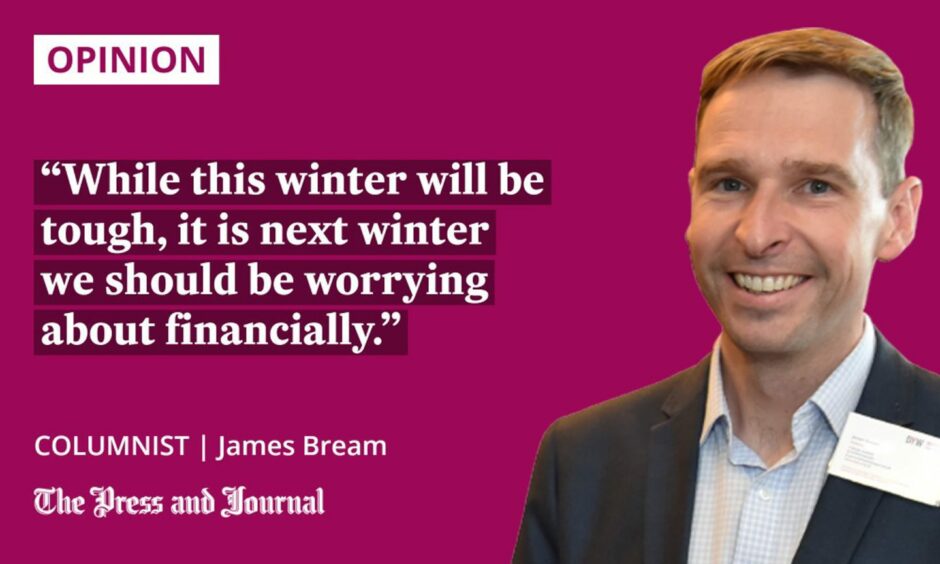We all like to be optimistic at the start of a new year, but things might get worse financially before they get better, warns James Bream.
At this time of year, I generally try to go a bit Mystic Meg in the column.
Back in January 2020, I predicted that, around the mid-2020s, there would be a massive push on clean energy, influenced by some significant (but unknown) policy change, or other external shocks. I think windfall taxes, war and energy transition driven by energy security foci fit well into that prediction.
I also forecast interest rates and inflation to both be in negative territory in 2029 – a few years off yet, so you’ll need to be patient on that one.
About 15 months ago, I also predicted high inflation in the short term. I’ve been consistent, though, in my view that, while this winter will be tough, it is next winter we should be worrying about financially.

There are a few drivers which I think could lead to inflation remaining high through this year (high is above 2%). These influences include the energy bill support given by government which, in effect, delays inflation from last year into this year and next; increased economic activity in China, which might have an influence on commodity prices; and war continuing in Ukraine.
We have also not seen any impact on inflation due to increased mortgage costs yet, which will flow through in the years ahead. I don’t think wage rises will necessarily have a massive impact on inflation, as these will be largely lost on people simply getting by day-to-day. So, my message is to plan carefully this year; plan for the worst and we may get better.
2022’s strikes could end up looking small fry
I’m concerned about these wider influences because of compound inflationary impacts. Say that inflation is 10% in the year to November 2022, and say it is 10% for the year to November 2023. What this means in practice is that a good that costs £1 in November 2021 would cost £1.10 in November 2022, and £1.21 in November 2023. In effect, the two-year inflation rate at November 2023 is 21%!
This means that people on low incomes getting 10% rises in wages aren’t matching inflation, even though often we look at these numbers in isolation, year-on-year. When workers realise this next year, it might make the striking this year look like small-fry stuff.
As I have written before, the problem is greater given that inflation rates are higher for those on lower wages, because this group spends a larger percentage of their income on the basics, like food and heating.
The Bank of England is more “optimistic” than me – but, then, it has been wrong before, and I think it’s better to look more carefully at the downsides. I take the view that there are further risks which are often not priced into forecasts. For example, what if another boat got wedged into the Suez Canal?
Forecasting economics is all about opinions, though – just think of it like your view on Aberdeen FC playing three at the back or a flat back four
Others do look more positively and say that energy prices will fall back from highs last year (thus creating negative inflation), and that there could be an improvement in global supply chain conditions. Forecasting economics is all about opinions, though – just think of it like your view on Aberdeen FC playing three at the back or a flat back four.
Start planning your holidays for 2024
For a nerd like me, the general growing interest in economics during 2022 was interesting. All of a sudden, the drivers of inflation, commodity costs, mortgage rate changes and all manner of financially-orientated economic measures were at the front of people’s minds. Again, looking back to my review in January 2020, it certainly puts into perspective what a benign decade that was, in many respects.
So, to my predictions for the year ahead. I think the Bank of England have undercooked their inflation forecasts, and think it will remain above 2% for 2023, but we’ll see much lower levels in 2024. I think we’ll end the year in a better place, with the pound strengthening (think about holidays for 2024).
We are likely to see investment in hydrocarbon and clean energy and windfall taxes clash, and become a real challenge.
At Westminster, it will feel like nothing is happening, which isn’t a bad thing. In Scotland, independence will go nowhere, but continue to be the SNP’s vote-winner, rather than performance on major issues.
In Aberdeen, city centre changes will continue to be piecemeal and frustrating, but I’m hopeful that there might be coalescence around some major opportunities later this year.
I also predict Duk Lopes to win the Ballon d’Or, and confirmation on what AFC will do on a stadium this year (again).
James Bream is CEO of Aberdeen-based Katoni Engineering and chair of DYW North East



Conversation